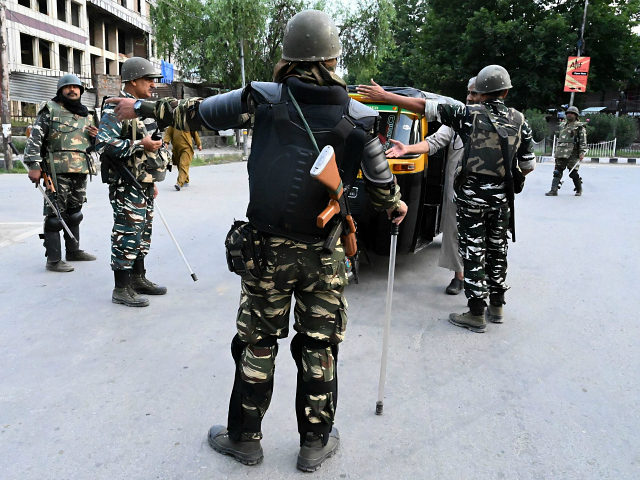Russia in recent days came out in support of India’s decision last week to rescind New Delhi-administered Kashmir’s limited autonomy.
Moscow has also expressed support for New Delhi’s move to break Indian Kashmir, which includes a portion administered by China, into two federally administered territories.
Beijing has argued that the decision violates its sovereignty. However, India claims it is not interested in claiming control of Chinese Kashmir.
“India was not raising any additional territorial claims,” India’s External Affairs Minister Subrahmanyam Jaishankar said in Beijing last week. “The Chinese concerns in this regard were therefore misplaced.”
Moscow’s support for New Delhi came amid China’s support for its “all-weather ally” Pakistan, which argues India’s recent decision in Indian Kashmir is “illegal.” Pakistan and China consider India their rival.
China and Russia are permanent members of the United Nations Security Council (UNSC). Last week, the United States, another permanent UNSC member, indicated that it also supports India’s position that the overall Kashmir dispute is for New Delhi and Islamabad to resolve.
On Wednesday, the Nikkei Asian Review reported:
The rest of the globe is beginning to react to India’s decision to scrap the special status of Jammu and Kashmir, with Russia becoming the first permanent member of the U.N. Security Council [UNSC] to back the move, which has otherwise garnered guarded responses.
Russian President Vladimir Putin “lauded” the Kremlin’s relationship with New Delhi on India’s Independence Day Thursday, the state-run TASS news service reported.
Quoting a congratulatory message Putin sent to India’s top leaders, TASS noted:
Putin “lauded the dynamic development of the Russian-Indian relations in the spirit of an exceptional strategic partnership and affirmed that the bilateral cooperation will continue to fruitfully prosper in all spheres … for the sake of ensuring stability and security in Asia and in the whole world.”
Russia reportedly declared in a statement issued last Friday, “We proceed from [the] fact that the changes associated with the change in the status of the state of [Indian Kashmir] and its division into two union territories are carried out within the framework of the constitution of the Republic of India.”
India revoked New Delhi-held Kashmir’s autonomy and broke the region into two territories administered by its central government last week.
New Delhi maintains that its Kashmir decision is an internal matter, arguing that it has no bearing on China or Pakistan. Nuclear-armed India, Pakistan, and China all have competing claims to territories in the Muslim-majority Himalayan region of Kashmir.
Pakistan’s push for a UNSC meeting to discuss India’s Kashmir decision laid bare the divergent positions between China and Russia.
China supports Pakistan’s call for a UNSC meeting to discuss the recent changes in Kashmir. Russia backs New Delhi’s argument that the overall Kashmir issue is a bilateral matter between India and Pakistan.
The disparity between China and Russia’s position on the Kashmir dispute came after the U.S. military and intelligence community warned against the growing relationship between Moscow and Beijing this year.
On Wednesday, the Nikkei Asian Review noted:
Pakistani diplomats are working intensely to mobilize the international community against India’s move. But the U.S. and many other nations have offered only tepid responses, calling on the South Asian neighbors to exercise restraint and maintain peace in the region.
“We want to maintain peace and stability, and we, of course, support the direct dialogue between India and Pakistan on Kashmir and other issues of concern,” Morgan Ortagus, a U.S. State Department spokesperson, declared on August 8. Before India’s recent moves in Kashmir, U.S. President Donald Trump offered to mediate the regional dispute between New Delhi and Islamabad. India quickly dismissed Trump’s offer, arguing that the issue for New Delhi and Islamabad to resolve.
The 57-member Organization of Islamic Cooperation (OIC), the second-largest international body after the U.N., has also failed to support Pakistan’s Kashmir position explicitly.
After holding a meeting in Saudi Arabia on August 6 at the behest of Pakistan, the OIC only reiterated its previous position.
In a statement, the OIC “condemned the gross human rights violations” in Indian Kashmir and encouraged stakeholders to settle the issue through negotiations.
While the U.N. and Pakistan have accused India of human rights violations in Kashmir, the U.S. and India have repeatedly said Islamabad backs terrorists in and around the region.
The European Union (EU) also appears “inclined” to support India’s position, the Economic Times noted.
In a statement, the 28-member EU said, “The European Union supports a bilateral political solution between India and Pakistan over Kashmir, which remains the only way to solve a long-lasting dispute that causes instability and insecurity in the region.”
Although Pakistan and India claim Kashmir in its entirety, a border separates the region between the two rivals.
Islamabad has ceded control of some of its Kashmir lands to Beijing. Meanwhile, India disputes China’s claim to territory on its side of the Kashmir border.

COMMENTS
Please let us know if you're having issues with commenting.